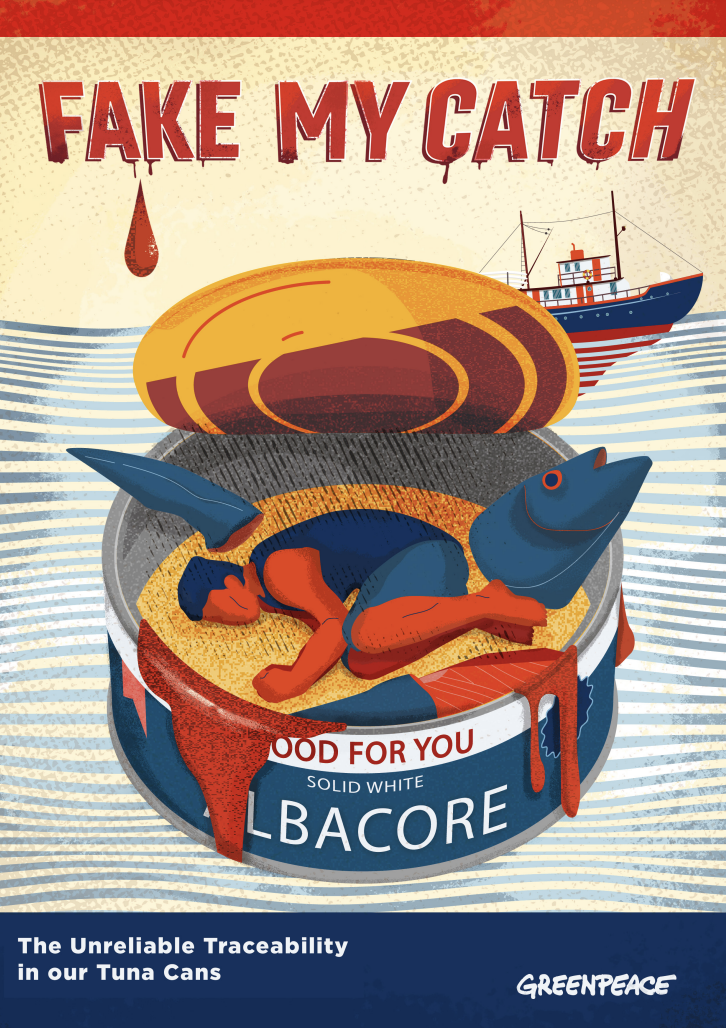US seafood company Bumble Bee, one of the leading companies in the canned tuna market with nearly 90% consumer awareness levels, and its Taiwanese parent company Fong Chun Formosa Fishery Company (hereinafter referred to as FCF), one of the top three global tuna traders, play an important role in the global tuna industry, and thus hold responsibility over the health of our ocean, the treatment of those working in the tuna supply chain and consumer choices. Both companies have policies on sustainability and corporate social responsibility that are supposed to extend through their supply chain, but according to the analysis in this report, neither are meeting their responsibilities.
This report finds that the information on Bumble Bee’s “Trace My Catch” website, which enables consumers to track the source of their tuna product from catch to can, is insufficient and in some cases incorrect. In a number of cases Greenpeace East Asia’s analysis found that the company was sourcing fish from vessels that had engaged in or were suspected of illegal, unreported and unregulated (IUU) fishing, forced labor, and/or human rights abuses. Therefore, Bumble Bee may not be fulfilling its responsibility and commitment to environmental sustainability and human rights, and without consumers’ knowledge seafood tainted with IUU and forced labor may have already entered the US market.
Based on 732 valid Bumble Bee tuna product codes, this report finds that Bumble Bee tuna was sourced from 290 different vessels, almost half of which are Taiwanese-flagged (119) or owned (22) distant water fishing vessels according to the information on Trace My Catch. In addition, some information on their Trace My Catch website contradicts official information from the Taiwan Fisheries Agency about where the supply vessel was authorized to fish. Verifying the vessel’s location against a third data source- Automatic Identification System (AIS) data from Global Fishing Watch, revealed that 28 fishing vessels’ fishing area information provided by Bumble Bee’s traceability tool was incorrect. In addition, 13 fishing vessels that supplied tuna to Bumble Bee were listed on TFA’s website for IUU fishing.
Based on interviews with nine fishers on six Taiwanese vessels that supplied Bumble Bee, it was found that all nine fishers had experienced or observed at least one of the International Labor Organization (ILO) indicators of forced labor, and six out of those nine fishers had experienced or observed four or more of the 11 indicators. All of the fishers interviewed said they have experienced excessive overtime and retention of identity documents, and over two-thirds of them had their wages withheld.
Greenpeace East Asia research found that Bumble Bee canned tuna collected from Harris Teeter (a wholly owned subsidiary of Kroger Co.) in Arlington, Virginia on April 12, 2022 was sourced from DA WANG, a Taiwanese-owned vessel confirmed to use forced labor by US Customs and Border Protection. In April 2022, Taiwanese authorities indicted the vessel captain, first mate, and seven others for their involvement for forced labor and human trafficking. Bumble Bee’s Trace My Catch website lists the source of this tuna as DA WANG on a trip in 2019, during which a fisher was reportedly beaten and died at sea. This leads to strong inference that seafood tainted with forced labor has already been sold in the US market.
On another Taiwanese fishing vessel, DE CHAN NO.116 evidence was revealed from Greenpeace East Asia interviews with fishers as well as Global Fishing Watch AIS data of suspected IUU fishing, including alleged shark finning and illegal transshipment at sea. The alleged illegal activities took place during a period when the ship was supplying tuna to Bumble Bee according to Trace My Catch.
Greenpeace East Asia urges immediate action from Bumble Bee and FCF, including issuing an apology to the exploited fishers, retailers and consumers, removing products suspected of IUU and forced labor-tainted tuna from the market, disclosure of their supplying vessels list, and establishment of an independent investigation committee for the flaw of Trace My Catch, to address issues of sustainability, legality and forced labor in their supply chain.

